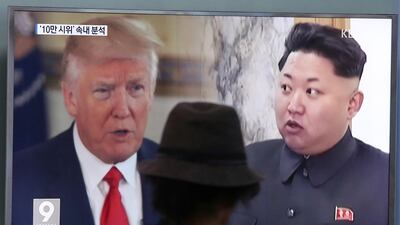“Fire and fury.” He liked it so much, he said it twice. “Fire, and fury, and frankly power.”
This was not off the cuff, or in the heat of the moment. These are the considered words of the president, snarling that “North Korea best not make any more threats to the United States”.
Which of course it promptly did. Donald Trump is no stranger to bombast or bellicosity – but Pyongyang is the past master. They trumped him, you could say; warning that the Korean People’s Army plans to rain “enveloping fire” – that word again – in the direction of Guam.
Which of course it won’t. Sneak attacks are North Korea’s speciality, preferably deniable – as in 2010 when it sank a South Korean corvette, or the cyber-attacks Seoul experiences almost daily.
A rogue regime that rarely even bothers (as law requires) to warn the International Civil Aviation Organisation of impending missile tests is hardly going to flag up any serious plans for aggression in advance, complete with date window and missile flight paths to a decimal point.
But Kim Jong-un loves the attention, and he has yet again seized the initiative with this latest reckless ploy.
Pyongyang barks incessantly; might it bite? The worry is real: its jaws and venom are fast growing stronger and nastier. No longer just a regional threat, which it has been for decades, the Kim regime’s accelerating nuclear and missile prowess render it now a global menace.
________________
Read more:
North Korea threatens to land four missiles close to Guam in mid-August
As the North Korean crisis deepens, Trump upends the nuclear calculus
________________
So what is the world to do? A long history of failure makes it easier, alas, to prescribe what not to do – although pointing this out never seems to stop repetition of the same old mistakes.
Mr Trump is right about one thing. ‘Strategic patience’, his predecessor’s mantra, does not work. Indeed, it has made matters much worse.
Mulling which of America’s foes might respond to an outstretched hand by unclenching their fist, Barack Obama was told that chances were better with Cuba and Iran than North Korea. That assessment proved correct. Yet the dangerous consequence of neglecting the hardest nut to crack was that this gave the Kim regime more time to build bigger and better weapons of mass destruction.
Another mistake was to ignore regime change in Pyongyang. Thanks to active US diplomacy, Kim Il-sung and Kim Jong-il became, to a degree, known quantities. Yet Kim Jong-un, after almost six years in power, remains largely unknown. It would help sound policy-making if some Americans besides Dennis Rodman had actually met Mr Kim, and the people around him.
Mr Trump, ever inconsistent, had once suggested he might meet Kim Jong-un – over a hamburger – and even that he would be “honoured” to do so. But then he settled on fire and fury.
Yet this draws the wrong lesson from the failure of ‘strategic patience’. As several wags have quipped, impatience is no better – and where’s the strategy? After half a year, Mr Trump’s actual policy on Korea remains as clear as mud. Every time the president or a colleague breathes fire and fury, someone else – often the secretary of state Rex Tillerson – steps in with calmer words.
So what’s the plan? In the front line, the US’s nervous regional allies South Korea and Japan would sorely like to know. Even Kim Jong-un must be confused. If that is intentional – some reckon Mr Trump is following Richard Nixon’s “madman” playbook – it clearly isn’t working.
What has worked – imperfectly, but better than either neglect or confrontation – is diplomacy. The last US president to mull a military strike on North Korea was Bill Clinton in 1994, over its nuclear cheating. When the Pentagon gave him apocalyptic casualty and cost projections, Mr Clinton drew back from the abyss – as Mr Trump surely must – and tried peace instead.
Within months the US-North Korea Agreed Framework, funded by South Korea and Japan, had all the North’s known nuclear materiel frozen under IAEA monitoring. True, it transpired later that Pyongyang cheated with a secret programme to enrich uranium. For that George W Bush dumped the framework – only to try again later, through Chinese-hosted six party talks.
For sure, North Korea is a nasty regime and a slippery customer. But US deterrence has kept the peninsula at peace for 64 years. To risk a horrific new war in Korea, at a safe distance from the US, over what Kim Jong-un may have and might (but won’t) do is unimaginable – isn’t it? Or to stumble into Armageddon by being lured into a lose-lose game of chicken.
Forget fire and fury. Winston Churchill was wiser: a true conservative, who unlike Mr Trump had also been a soldier. Jaw-jaw, said Churchill, is better than war-war. That is an abiding truth.

